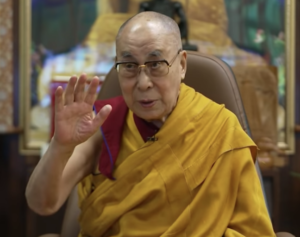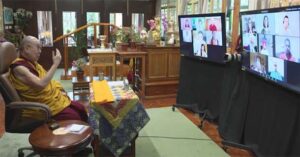
Photo: Screen grab
“Today, because of the pandemic, many people are suffering. We need to have compassion combined with an understanding that the threat of the pandemic can be overcome”, observed His Holiness the Dalai Lama during a three-day online teaching on Chandrakirti’s Entering the Middle Way which he gave to a group of Indian students from Nalanda Shiksha. Nalanda Shiksha is a group of 17 different centres from all over India committed to work for the Buddhadharma and its authentic traditions and teachers, without bias to any specific school or lineage. The teaching took place by video link from his residence in Dharamshala on July 17 – 19.
Speaking to the students, His Holiness pointed to his head and said “all answers lie here” before beginning a three-and-a-half-hour discourse which included answering questions posed by the group – questions which related to what the world is currently seeking answers to – the purpose of life, nature of existence and the reality of our worldly systems.
During the text of his teaching, His Holiness quoted verses by Nagarjuna who, he said was “like a second Buddha” and who wrote the Fundamental Wisdom of the Middle Way, and by Nagarjuna’s student Aryadeva who wrote the Four Hundred Verses. His Holiness said that Entering into the Middle Way is a commentary on these and other texts and that Chandrakirti was the one who explained Nagarjuna’s thoughts “most precisely”.

Photo: Screen grab
His Holiness observed that each one of us seeks happiness in our lifetime; the source of happiness is compassion – something we can understand by distinguishing between compassion for ourself and for others, and eventually putting compassion for others before the self. This is an understanding that we can build through a continuous process of listening, analysis and reflection, and which can lead to wisdom and transformation. From his own experience he said, “This understanding required patience. It’s not easy, but if you make the effort you can gradually bring about change, which will give rise to peace of mind in individuals and as a consequence in the world”.
His Holiness said that people have a general tendency to understand happiness as an end to suffering, which, according to Buddha’s Four Noble Truths, “must be understood, though there’s nothing to be understood”. “When we say things do not exist as they appear,” explained His Holiness, “they do exist by way of dependence on other factors. They give rise to effects.”
He said we must remember to take precautions for fighting the pandemic and ended the session saying that he hopes to share more with a physical audience in Bodhgaya by end of this year.




 Print
Print Email
Email